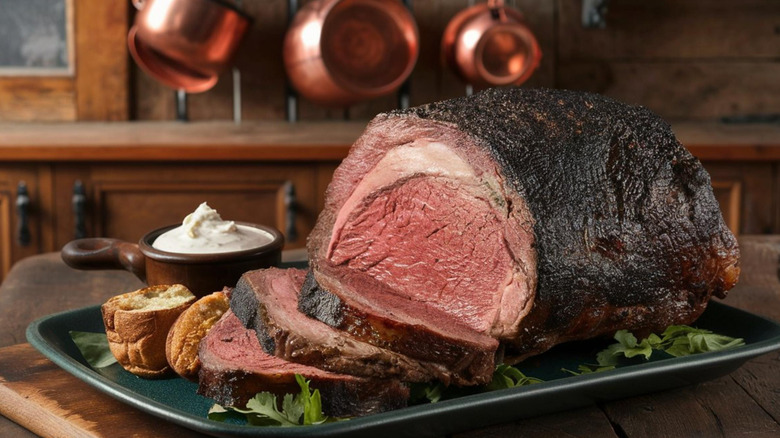The Quality Cut Of Roast Alton Brown Loves To Cook For The Holidays
Entertaining during the holiday season can be joyful for a home cook hoping to exercise their culinary chops. But when it comes to selecting a meal centerpiece, it can also be tough to narrow it down. From filet mignon to lobster tail, traditional turkey to Honey-Baked Ham, there are options to suit any palate and please a crowd. But celebrity chef, TV host, and cookbook author Alton Brown has a clear favorite — the rib roast. In his opinion, this flavorful cut of beef fits the bill for a celebration.
If you'd like to follow Brown's example and serve a rib roast for your holiday, purchasing the meat is your first step. The terminology of rib roast can be a little tough to navigate, especially as you may find it mislabeled as prime rib, and there are three designations of quality for a rib roast — Prime, Choice, or Select. Prime is the highest, but Brown has no problem with Choice, which is the middle level (Select being the lowest).
No matter which you choose though, rib roast is not exactly a cheap cut. When coupled with the pressure of holiday entertaining, that means this could be a very high stakes cooking situation, so having a sound strategy ahead of time will be a major help in easing your seasonal stress. Fortunately, Brown has some handy tips that help ensure optimal deliciousness.
Simple tips for a satisfying rib roast
In addition to deliciousness and versatility, another benefit of the rib roast is that you can pick it up a week in advance and avoid some last-minute shopping chaos. In fact, according to Alton Brown, it behooves you to have your meat hanging around. Brown explains in a video on his YouTube channel that stashing it in the fridge for about five to seven days wrapped in a cheesecloth will dry it out a bit, which is critical to promoting a satisfying char and concentrating the meat's natural flavors.
If you need to put this meal together in a pinch, however, it's possible to speed up the process. Season your roast with salt to draw out some moisture (Brown says about two teaspoons per bone should do the trick — just be cautious of salting pitfalls that can ruin your prime rib), and allow it to rest in the fridge uncovered overnight or up to 24 hours in advance.
Either way, wrapping your roast in cheesecloth protects the exterior and will keep it tender during the cooking process (Brown suggests three layers here). If you have any leftovers, there are ways to reheat prime rib so it's not dry, meaning that extra effort won't be wasted, even the next day. A ribeye is also a perfect steak for grilling if you happen to have access to a barbecue, but no matter what, Brown's favorite holiday meat may just become your newest tradition.

